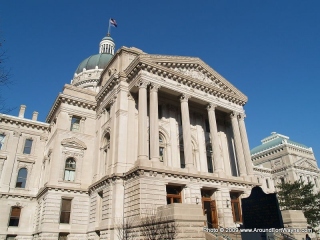An email from the Indiana GOP Senate Majority Caucus:
GOP To Democrats:
Join Us In ‘Prioritizing Students, Protecting Taxpayers’
House Republicans stand with Senators in seeking budget concurrence, governor’s signatureINDIANAPOLIS (June 23, 2009) – Republican legislators today called upon their Democrat counterparts and Gov. Mitch Daniels to sign onto the Senate’s version of a two-year budget that “prioritizes students and protects taxpayers.”
House Republicans joined the Senate Republican Caucus in encouraging legislative Democrats to concur with the Senate budget bill and for Gov. Mitch Daniels to sign it into law, effectively ending the special budget session.
With bipartisan support, Indiana senators voted 33 to 17 this afternoon to pass a balanced $28.8 billion budget that includes about $1 billion in federal stimulus funds.
President Pro Tem David Long (R-Fort Wayne) said the Senate budget reduces state spending to reflect declining state revenues, maintains $1 billion in emergency cash reserves and avoids general tax increases.
“Clearly, the national recession has had a tremendous impact on all 50 states’ students, unemployed, small businesses and industries,” Long said. “Nationwide, state coffers have been hit hard, leaving 47 states facing budget shortfalls, 19 states cutting social services for low income citizens and 16 states enacting tax increases. Because of sound fiscal management in the recent past and this responsible roadmap for the future, it is important to note Indiana will neither cut education funding nor raise general taxes.”
Under the Senate plan authored by Sen. Luke Kenley (R-Noblesville), public K-12 schools would receive a .5 percent increase in state funding in 2010 and another .5 percent in 2011. Should Indiana’s economy improve from the national recession more quickly than expected, a so-called “education trigger” in the bill would provide one dollar for every two dollars of unanticipated revenue.
Long credited Kenley, Sens. Brandt Hershman (R-Wheatfield), chair of the Senate Tax and Fiscal Policy Committee, and Gary Dillon (R-Columbia City), ranking member of the Senate Appropriations Committee, for striking 31 major funding compromises with House and Senate Democrats in trying to craft a bipartisan fiscal blueprint for the state.
Kenley, Hershman and Dillon all believe Daniels will sign the Senate budget version if and when delivered by lawmakers.
Here are major funding areas in the Senate-passed budget proposal:
K-12 & Higher Education: Indiana’s public K-12 schools would see statewide average increases in state funds of .5 percent the first year and another .5 percent the second. In 2010, schools will also receive an additional $442 million in new, federal Title 1 and special education funding and another $337 million in new federal monies for those purposes in 2011. In all, public K-12 schools will receive $6.51 billion in 2010 and $6.54 billion in 2011. The Woodrow Wilson Teaching Fellowship Program, which provides science, technology and math teachers to rural schools, would receive $5 million in 2010 and 2011. Line items for summer school, textbooks, full-day kindergarten and non-English speaking education would be fully protected at current funding levels. Classroom computer grants, named for the late Sen. David Ford (R-Hartford City), would be $8.8 million in fiscal year 2010 and another $3.8 million in 2011. The Senate Republican budget proposal includes no limitations on new charter schools and allows enrollment growth at existing charters. Student aid for higher education would see an increase of 3 percent per year. Overall, total appropriations for Indiana’s public universities will be maintained at 2009 levels through the use of federal stimulus monies.
Job Creation & Transportation: The Senate Republicans’ budget bill does not include a general tax increase, sending a positive signal to businesses wanting to maintain, continue and increase growth and expansion across Indiana. Major Moves money would be protected from being raided for uses other than roads and highways. More than $545 million would be invested in 2010 and another $535 million would be used in 2011 to pave the way for job creation and economic development statewide. In addition, Indiana’s Twenty-First Century Research and Technology Fund would be funded at a level of $25 million each year. State tourism projects would be funded at a level of $4 million each year of the biennium. To encourage job-creation, ten higher education capital projects at public institutions across the state would receive $137 million of one-time federal stimulus funds, including $10 million for bonding at Ivy Tech Community College (ITCC) in Warsaw, $20 million for ITCC’s Anderson campus and $20 million for ITCC’s Bloomington Campus. Indiana University, Purdue University and Indiana University Purdue University-Indianapolis would each receive $10 million for Life Science Lab Renovations.
Public Health & Family Services: Senate Republicans would protect Hoosiers from losing access to critical state-offered health services during these difficult economic times. Medicaid coverage of children, low-income working parents, the disabled and elderly will be fully funded based on the April 17, 2009 Medicaid Forecast. Medicaid — a jointly funded federal-state program providing health care to about 800,000 Hoosiers — will receive state funding totaling $3.38 billion over fiscal years 2010 and 2011, not including federal monies. Other line items for health and human services include $48 million each year for the CHOICE program (Community and Home Options to Institutional Care for the Elderly and Disabled) to provide in-home care to Indiana’s elderly and disabled. Indiana’s six regional area health education centers — which train individuals in health professions to serve under-represented populations — are slated to receive $1.4 million. The Senate Republicans’ budget also contains an appropriation of $145,000 per year to fund the creation of a Department of Child Services Ombudsman.
Public Safety & Corrections: Unlike other states’ fiscal situations, Indiana will be able to forego damaging cuts to public safety. Indiana’s Department of Corrections would receive approximately $678 million in fiscal year 2010 and $693 million in fiscal year 2011 under the Senate GOP budget. This proposed amount would avoid the agency’s request for approximately $45 million in capital funds to increase prison capacity for maximum and medium offenders.
